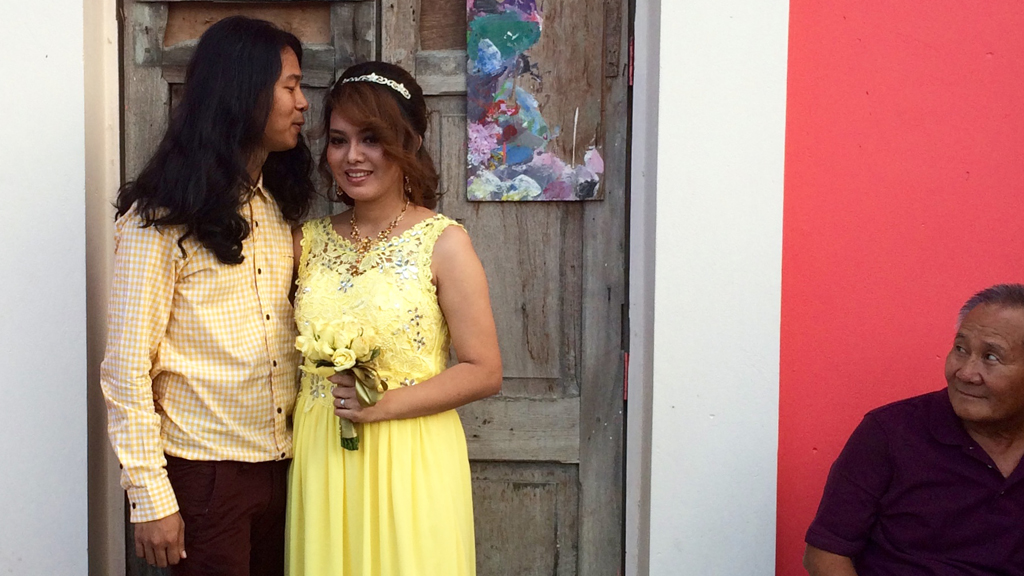A 'revolutionary wedding' amidst Burma's student crackdown
Ko Htet and his wife Su Yee Win are lovers in a dangerous time, which happens to be an entirely unexpected feature of their new life as a married couple.
Ko Htet and his wife Su Yee Win are lovers in a dangerous time, which happens to be an entirely unexpected feature of their new life as a married couple.
When they posed for a series of classy black and white photographs on the grounds of Yangon University earlier this year, they had not spent a whole lot of time worrying about their future. Instead they were comfortable just rambling through the present.
Along with his studies, Ko Htet, was gaining a reputation as a popular singer at bars and clubs while his fiancé was busy with her university course in Burma’s biggest city, Yangon.
Everything changed four weeks ago, after a police crackdown against student protesters in a dusty town called Letpadan.
The demonstrators, who were trying to march to Yangon, were calling for educational reform and the recognition of student unions by the government.
What they got was a vicious beating by a mixture of normal and paramilitary police – and the arrest of more than 120 students and activists.
Outraged by events 60 miles to the north, Ko Htet and a couple of other student leaders decided to hold a protest the following day at an intersection in Yangon – but the police went after them as well, accusing them of “holding a demonstration without permission”. Facing a six-month prison term, the student musician went into hiding, adopting a disguise in daylight and changing locations at night.
The dramatic change in circumstances came as something of shock to Ko Htet and many other student activists. Back in 2011, the people of Burma were promised democracy and basic human rights – like freedom of expression – by the generals who had run it for 50 years.
And there was significant progress, at least initially. Dissident Aung San Suu Kyi and hundreds of other political prisoners were released, an elected assembly was convened and a free press allowed to flourish.
With a general election due in November however, the former generals now running the country seem to have changed direction, clamping down on public protest, putting the press in an ever-tightening straitjacket – and talking about the need for “very gradual change” as the political parties “mature”.
Still, Ko Htet and his bride Su Yee Win, were not going to postpone their wedding for anyone, not even the secret police who were hot on the groom’s tail. The wedding and reception were planned for a ramshackle rooftop in the very centre of the city and when we turned up we found Ko Htet greeting friends and relatives in the stairwell.
“It is going to be an adventure wedding,” said the groom, laughing to himself. “A revolutionary wedding. I am not going to hide on my wedding day. We planned this months ago.”
Out on the rooftop, there were dozens of brightly-dressed guests, as well musicians, technicians and people fixing up the meal. There was also a woman, dressed in her wedding finery, standing at the building’s edge. Her name was Kin Lay Nge and she had her eyes trained on a group of men hanging around downstairs at the building’s entrance.
“They’re spies”, she said, “the shadows,” a reference to Burma’s plain-clothes police.
Ms Kin Lay, who is the groom’s aunt, was worried the wedding was about to be busted. “They’re down there watching us. Anytime they can come up and disrupt it. But we are ready to face what happens because we have decided to be brave. But I feel sad for (Ko Htet and Su Yee Win) and for all young people as well. I wish they could have a better future.”
As the light failed, the rooftop chatter turned to urgent whisperings. It was time for the groom to go. I asked him when he would see his new wife again. “Soon, soon” he said, with seeming confidence.
However, Ko Htet had to get past the ‘shadows’ who were still waiting for him on the pavement. The student activist changed out of his wedding gear and thrust a stiff-brimmed baseball hat over his head, then inserted himself amidst a group of departing guests. Together, they plunged down the partly-lit stairwell and out into the night, past the shadow-men still hanging around the front door.
Ko Htet remains in hiding – but as you will see in our special report, students and activists continue to challenge the authorities, despite their increasing intolerance for dissent.
Follow @c4sparks on Twitter.


